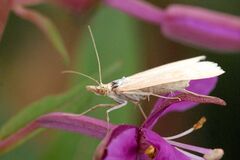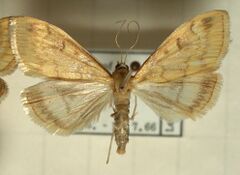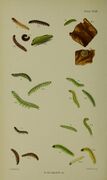Biology:Sitochroa verticalis
| Sitochroa verticalis | |
|---|---|
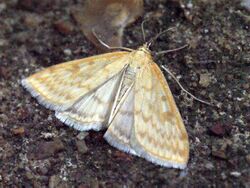
| |
| Sitochroa verticalis | |
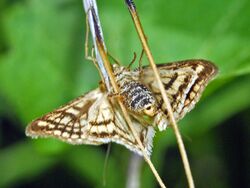
| |
| Underside | |
| Scientific classification | |
| Domain: | Eukaryota |
| Kingdom: | Animalia |
| Phylum: | Arthropoda |
| Class: | Insecta |
| Order: | Lepidoptera |
| Family: | Crambidae |
| Genus: | Sitochroa |
| Species: | S. verticalis
|
| Binomial name | |
| Sitochroa verticalis | |
| Synonyms | |
| |
Sitochroa verticalis, common name lesser pearl, is a species of moth of the family Crambidae.
Distribution and habitat
This species can be found in most of Europe, including British Islands. The distribution extends from west Portugal, across Central and Eastern Europe, Siberia[1] to the Russian Far East and Japan . In the north the area extends to southern Sweden, in the south to Italy.[2] These moths prefer open landscape with dry or slightly humid grassy areas.[3]
Description
Sitochroa verticalis can reach a wingspan of about 30–34 mm. These moths have yellowish or light ocher forewings with three thin brown cross lines, while the underside of the forewings are strongly-marked with dark brown lines. The hind wings are whitish yellow and have two darker transverse lines. The caterpillars are green, with a light brown head. They can reach a body length of about 29 mm (1.1 in). This species is rather similar to Ostrinia nubilalis.[4]
Biology
These moths fly from May to August, with one to two generations, depending on the location. The second generation may occur in August and September. They are nocturnal and come to artificial light sources. Usually they hinbernate in a hibernaculum and pupate the following spring.[5] The larvae feed on a variety of herbaceous plants, mainly on Cirsium arvense,[6] Cytisus scoparius, Viola odorata, Centaurea jacea, Atriplex, Rumex, Teucrium, Diplotaxis, Nettle and Sarothamnus species.[5][7]
Gallery
References
- ↑ Ayuna A. Shodotova: Pyralid Moths (Lepidoptera, Pyraloidea) of Buryatia: Family Pyraustidae. In: Entomological Review. 88(5), 2008, S. 543–557, doi:10.1134/S0013873808050035
- ↑ Fauna Europaea
- ↑ František Slamka: Die Zünslerfalter (Pyraloidea) Mitteleuropas. 2., teilweise überarbeitete Auflage. Bratislava 1997, ISBN 80-967540-2-5. (in German)
- ↑ UK Moths
- ↑ 5.0 5.1 Catalogue of the Lepidoptera of Belgium
- ↑ Eol
- ↑ Markku Savela Funet
- Goater, B. (1986) British Pyralid Moths, Colchester: Harley Books.
External links
- kleinevlinders.nl (in Dutch)
- Lepiforum (in German)
- Paolo Mazzei, Daniel Morel, Raniero Panfili Moths and Butterflies of Europe and North Africa
- Naturhistoriska risksmuseet
Wikidata ☰ Q147078 entry
 |
